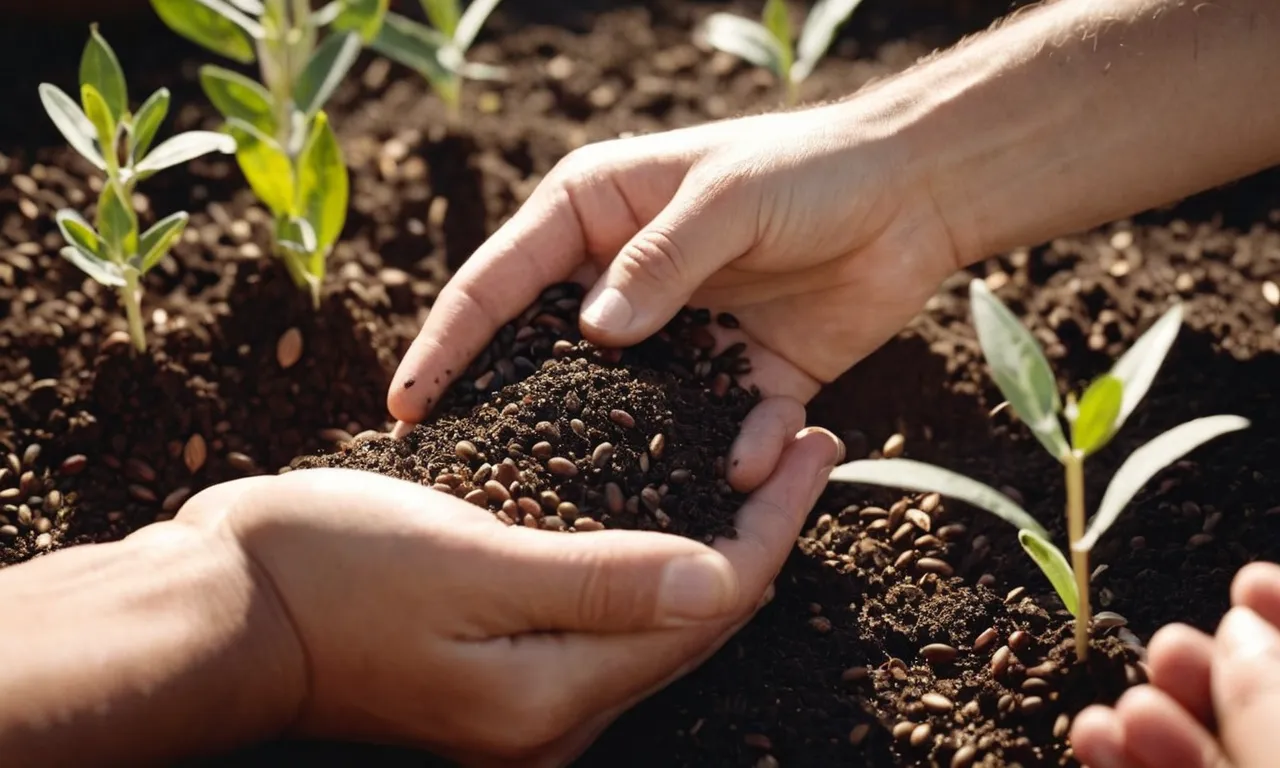What Does The Bible Say About Sowing Seeds?
The concept of sowing seeds is a recurring theme throughout the Bible. Seeds are often used as a metaphor for our actions, attitudes, and spiritual condition. In this comprehensive article, we will examine the many references to seeds and sowing in the Bible to understand what God’s Word teaches us about this important topic.
If you’re short on time, here’s a quick answer: The Bible encourages sowing physical and spiritual seeds as an act of faith and generosity that will lead to abundant blessings and spiritual growth. Sowing seeds represents investing in the growth of God’s Kingdom.
Old Testament References to Sowing Seeds
Sowing and Reaping
The Old Testament contains many references to sowing seeds and reaping the harvest. A key verse is Galatians 6:7 which states, “Do not be deceived: God cannot be mocked. A man reaps what he sows.” This conveys the principle that our actions and choices have consequences.
If we sow righteousness, we will reap blessing and goodness. But if we sow wickedness, we will reap trouble and sorrow.
Several Old Testament passages illustrate this principle. Proverbs 11:18 says, “A wicked person earns deceptive wages, but the one who sows righteousness reaps a sure reward.” Hosea 8:7 declares, “They sow the wind and reap the whirlwind.”
In Job 4:8, Eliphaz asserts, “As I have observed, those who plow evil and those who sow trouble reap it.” These verses warn that living sinfully leads to negative outcomes. But sowing righteousness brings positive results.
As Proverbs 22:8 states, “Whoever sows injustice reaps calamity, and the rod they wield in fury will be broken.”
Sowing Righteousness and Justice
The Old Testament urges sowing righteousness, justice and goodness. Proverbs 11:18 says sowing righteousness leads to “a sure reward.” We reap blessings when we live rightly and honor God. Micah 6:8 tells us, “He has shown you, O mortal, what is good. And what does the Lord require of you?
To act justly and to love mercy and to walk humbly with your God.” Acting justly includes dealing fairly with others and seeking their good. This pleases God.
Isaiah 32:16-17 describes the blessings of sowing righteousness: “The Lord’s justice will dwell in the desert, his righteousness live in the fertile field. The fruit of that righteousness will be peace; its effect will be quietness and confidence forever.”
Here, righteousness is pictured as seed that yields a harvest of peace and security when planted in fertile soil. Sowing righteousness brings blessing.
Sowing Wickedness and Iniquity
In contrast to sowing righteousness, the Old Testament warns against sowing wickedness, evil and iniquity. Proverbs 22:8 says, “Whoever sows injustice reaps calamity.” Sowing sin brings disaster, not blessing. Hosea 8:7 declares, “They sow the wind and reap the whirlwind.”
Sowing evil brings destructive consequences. As Proverbs 11:18 warns, “The one who sows wickedness reaps trouble.”
Jeremiah 4:3 instructs, “Break up your unplowed ground and do not sow among thorns.” Here, “unplowed ground” represents wicked, stubborn hearts. The verse urges turning from sinful ways and removing wickedness from our hearts. Otherwise, consequences will follow.
Galatians 6:8 explains, “The one who sows to please his sinful nature, from that nature will reap destruction.” Sowing to our sinful nature brings ruin. But sowing to please the Spirit yields eternal life. Our actions produce results, for good or bad.
New Testament Parables About Seeds
Parable of the Sower
The Parable of the Sower is found in Matthew 13:1-23, Mark 4:1-20, and Luke 8:4-15. In this parable, Jesus uses the metaphor of a sower sowing seeds to illustrate how people hear and respond to the Word of God.
The seeds represent the message of the Gospel, and they are scattered on four different types of soil representing four different responses:
- The seed that falls on the path represents those who hear the message but do not understand it, allowing Satan to snatch it away.
- The seed on rocky soil represents those who initially receive the word with joy, but fall away when trouble comes because the seed has not taken root.
- The seed among thorns represents those who hear the word, but the worries and pleasures of life choke out the growth.
- The seed on good soil represents those who hear, understand, and produce a harvest for the Lord as the seeds grow and multiply.
Jesus explains that the condition of the soil – our hearts – determines how we respond when we hear God’s Word. As the famous preacher Charles Spurgeon once said, “Sow an act, and you reap a habit. Sow a habit and you reap a character. Sow a character and you reap a destiny.” Our receptivity is key.
Parable of the Growing Seed
The Parable of the Growing Seed is found only in Mark 4:26-29. Here Jesus compares the Kingdom of God to a man scattering seed on the ground. The seed sprouts and grows naturally, the man knows not how. Seedtime and harvest come in proper order, but the farmers merely play a small role.
God designed the natural growth cycle and brings about the fruitful harvest in due time.
Similarly, though we are responsible to sow the seed of God’s Word, it has a power of its own to change hearts and lives. We can spread the Gospel through words and actions, but only God can transform people from the inside out.
Our job is not to control or manipulate outcomes, just to keep planting seeds through faithfulness to Christ.
Parable of the Mustard Seed
The Parable of the Mustard Seed is found in Matthew 13:31–32, Mark 4:30–32, and Luke 13:18–19. In this story, Jesus says that the Kingdom of Heaven is like a mustard seed which, though tiny, grows into the largest of garden plants.
It illustrates how God can take His message of salvation and expand it mightily despite modest beginnings.
When Jesus told these parables, many Jewish people were expecting a dramatic military ruler to deliver them from Roman occupation. But instead, Jesus spoke of small seeds and a hidden kingdom growing slowly. God was at work in a quiet yet powerful way that they did not expect.
And 2,000 years later, the Church has grown far beyond what anyone could have foreseen!
The takeaway is that we should not despise small things (Zech 4:10). Tiny acts of faithfulness can yield a great harvest over time. Just as the giant mustard bush has tiny seeds, God’s kingdom may involve humble servants living faithful lives that end up touching multitudes.
Spiritual Meaning and Application
Seeds Represent God’s Word
In the Bible, seeds are often used as a representation of God’s Word and its ability to produce spiritual growth, change lives, and multiply (Mark 4:1-20). Just as tiny seeds have the potential to grow into large plants and trees, God’s Word starts small but can grow to have great impact.
As we scatter the seed of God’s Word, through sharing the gospel and living out our faith, we spread the kingdom of God.
Jesus compared the Word of God to different types of seeds sown on different types of soil (hard, rocky, thorny, good) in the Parable of the Sower (Matthew 13:1-23). Our responsibility is to sow the seed; the type of soil represents people’s responses.
Like seeds, God’s Word may land on deaf ears or unreceptive hearts. But when it lands on fertile soil (a receptive heart), it bears spiritual fruit. We must sow persistently and patiently, trusting the harvest to God.
Sowing Requires Faith and Patience
Whether planting literal seeds in a garden or sharing biblical truth, sowing requires patient faith. “Let us not become weary in doing good, for at the proper time we will reap a harvest if we do not give up” (Galatians 6:9).
Farmers cannot rush a harvest; they must diligently work while awaiting fruit from the seeds. This agricultural principle also applies spiritually.
When we generously spread God’s Word through evangelism, discipleship, and living out kingdom values, we can trust God to multiply our efforts. But growth happens in His timing. We demonstrate faith when we persistently sow seeds of truth without knowing when or how God may use them to impact people (1 Corinthians 3:6-9).
The Holy Spirit is the one who ultimately produces changed hearts and spiritual fruit.
Sow Generously to Reap Generously
While God graciously grows our modest efforts, greater sowing reaps greater harvests for His glory. Applying another agricultural principle, Paul said, “Remember this: Whoever sows sparingly will also reap sparingly, and whoever sows generously will also reap generously” (2 Corinthians 9:6).
If a farmer sows only a handful of seeds, he cannot expect to reap bushels of crops.
This principle connects to financial offerings in the context of 2 Corinthians 9, but also applies more broadly. The more seeds of God’s Word we sow through generosity and spiritual disciplines, the more abundantly we can reap.
As we give financially, use our spiritual gifts, share knowledge of Christ, and live out godly values, we spread kingdom seeds. This diligent sowing will yield fruit such as changed hearts, growing faith, and new believers added to the church.
Sowing in Church and Missions
Giving Financially
Giving financially to support the church and missions is an important way believers can sow seeds for God’s kingdom. The Bible encourages generous and sacrificial giving to advance God’s work (2 Corinthians 9:6-15).
When we give cheerfully and freely to our local church and mission organizations, we enable ministry to happen locally and globally. Our financial gifts can help build churches, send missionaries, print Bibles, feed the hungry, shelter the homeless, and spread the gospel worldwide.
Simply put, our financial offerings water the soil for spiritual growth.
Tithing, giving 10% of one’s income, is a biblical model for giving (Malachi 3:10). Many Christians make tithing a regular spiritual practice. Beyond tithing, believers can also give special offerings for missions, benevolence, building projects, and other kingdom causes.
God blesses and multiplies our generous gifts – the more we sow financially, the more fruit will grow for God’s glory.
Using Spiritual Gifts
Every Christian has been given unique spiritual gifts by God to build up the church (1 Corinthians 12:4-11). When believers use their spiritual gifts faithfully in ministry and service, it sows gospel seeds and bears spiritual fruit.
For example, those with the gifts of teaching or encouragement can disciple new believers, sowing seeds of faith. Believers gifted in hospitality can provide meals for the needy or housing for traveling missionaries.
Those with administrative gifts can organize programs supporting evangelism and community outreach. Each gift utilized for God’s purposes helps advance the mission of Christ.
The church thrives when every part is working properly, and members are actively sowing their spiritual gifts (Ephesians 4:11-16). Serving within the Body of Christ may involve volunteering on ministry teams, teaching Sunday School, hosting small groups, leading worship, providing congregational care, and more.
As diverse gifts interact, the church grows. It takes all parts doing their special role for the seed of God’s Word to spread and take root in people’s hearts.
Evangelism and Discipleship
Two primary ways Christians sow gospel seeds is through evangelism and discipleship. In the Great Commission, Jesus commanded believers to “go and make disciples of all nations” (Matthew 28:19). The seed of the Word must be shared broadly through evangelism so that many will come to faith in Christ.
Evangelism techniques like preaching, personal witnessing, literature distribution, friendship evangelism, and media outreach can scatter the seed far and wide.
Equally vital is the careful discipling of new converts to become mature followers of Jesus. Discipleship involves teaching biblical doctrine, modeling righteousness, equipping for ministry, and nurturing spiritual growth through mentoring relationships.
Like a wise farmer nurtures crops to maximize fruit, disciplers help new Christians become firmly rooted in faith. They water and fertilize the seeds planted through evangelism.
Every Christian can participate in both evangelism and discipleship. We need farmers scattering seed and gardeners nurturing growth. Together they enable the kingdom harvest as souls come to faith and grow to maturity in Christ.
Each redeemed life multiplies the process by sharing the gospel with others in an ever-expanding, rippling effect to the ends of the earth.
Conclusion
In summary, the Bible contains many references to seeds and sowing, often using these concepts metaphorically. Sowing physical and spiritual seeds requires faith and wisdom, but leads to abundant blessings when done according to God’s principles of righteousness and generosity.
As we sow generously in God’s Kingdom through our finances, service, and witness, we can trust Him to produce an abundant harvest in our lives and communities.








